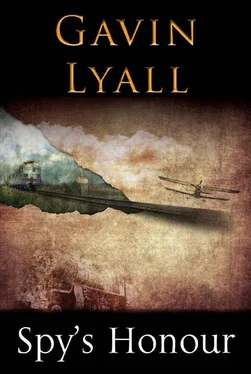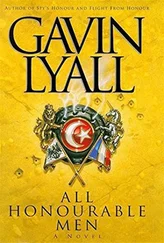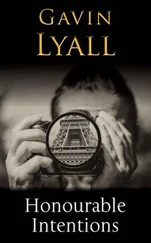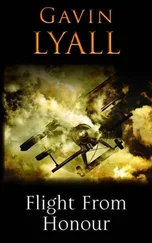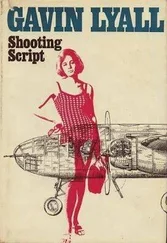Gavin Lyall - Spy’s Honour
Здесь есть возможность читать онлайн «Gavin Lyall - Spy’s Honour» весь текст электронной книги совершенно бесплатно (целиком полную версию без сокращений). В некоторых случаях можно слушать аудио, скачать через торрент в формате fb2 и присутствует краткое содержание. Год выпуска: 2013, ISBN: 2013, Издательство: PFD Books, Жанр: Шпионский детектив, Исторический детектив, на английском языке. Описание произведения, (предисловие) а так же отзывы посетителей доступны на портале библиотеки ЛибКат.
- Название:Spy’s Honour
- Автор:
- Издательство:PFD Books
- Жанр:
- Год:2013
- ISBN:0340609729
- Рейтинг книги:5 / 5. Голосов: 1
-
Избранное:Добавить в избранное
- Отзывы:
-
Ваша оценка:
- 100
- 1
- 2
- 3
- 4
- 5
Spy’s Honour: краткое содержание, описание и аннотация
Предлагаем к чтению аннотацию, описание, краткое содержание или предисловие (зависит от того, что написал сам автор книги «Spy’s Honour»). Если вы не нашли необходимую информацию о книге — напишите в комментариях, мы постараемся отыскать её.
Spy’s Honour — читать онлайн бесплатно полную книгу (весь текст) целиком
Ниже представлен текст книги, разбитый по страницам. Система сохранения места последней прочитанной страницы, позволяет с удобством читать онлайн бесплатно книгу «Spy’s Honour», без необходимости каждый раз заново искать на чём Вы остановились. Поставьте закладку, и сможете в любой момент перейти на страницу, на которой закончили чтение.
Интервал:
Закладка:
“We’re supposed to use our discretion.”
“By that d’ye mean yer little gun?”
“No, I haven’t brought that.”
“That’s the first good news I’ve heard about this job. If somebody found that on ye, specially taped behind yer knee, it’d be a badge saying Secret Service. Ye don’t happen to have such a badge, do ye?”
“Of course not.” Ranklin was too ashamed to admit that he had once asked the Commander if such a thing existed – a distinctive signet ring or cigarette case, even something pasted inside a watch – to identify brother agents to each other. The Commander had said with threadbare patience: “I thought I told you when you joined the British Secret Service that Britain has no Secret Service. Therefore, how can it have a badge?”
O’Gilroy was saying: “Fine, but then what will we be doing with him? – just kick the right to vote off’n him?”
“Well, try to find out who he is and who he’s working for. No, I don’t imagine anybody’ll just jump at us from a dark alley, that sort of thing …” But he had no idea of what the unknown anybody might do – nor of what he would do in their place …
“And don’t smoke your cigarettes down that far,” he snapped at O’Gilroy’s lean and exasperating smile.
The idea of treating O’Gilroy as an equal – another country gentlemen, albeit an eccentric Irish one – had at first struck Ranklin as impossible, but in fact came easily. His great weakness as an officer, one which made him an indifferent leader, was that unless he treated a man as his equal, he had little idea of how to treat him at all. He had often blessed the juvenile whim that had made him pick the Artillery when the inflexible pattern of life had forced him, as second son, to join the Army.
Trying to be a conscientious infantry officer, he now realised, would have been a life of constant doubt and embarrassment. He had learnt that he could cope in battle, steadily and thoughtfully if not with much dash. He could order men to risk their lives or kill others: that, after all, was what they were there for. But listening to a man’s marital troubles, or his lame excuses for horrible misdeeds, just terrified him. It wasn’t the gross details, it was the expectation that he should give advice that would do some good. Why should it? Who on earth was he to judge? And the Army had far more marital problems than battles.
But in the Guns, the rapidly evolving world of breech mechanisms, recoil buffers and sighting systems, the interlocking problems of range, muzzle velocity, trajectory, convergence and probability theory – all this created a firm ground on which he could meet other minds. And, largely, let their incontinent bodies look after themselves.
Perhaps that was why he had taken to O’Gilroy at Ladysmith. Pressed into service as a replacement gun number, the lad had been unforthcoming about himself even when there can have been little to forthcome about, but hungrily anxious to learn about the guns’ mechanisms and routines. In teaching him, Ranklin may have been trying to create another equal, but the infantry had swallowed him up again once the siege was lifted.
And now, after thirteen years and some weeks of careful coaching, he had O’Gilroy back – as an equal.
The equal smiled wickedly and took another cigarette from his gold case – second-hand, as were his watch and wallet and thus well worn – and having stared carefully at its length, lit it. Ranklin clamped his mouth on his pipe and said nothing.
It had been easy to get O’Gilroy shaved, barbered and into the right tweedy clothes, and not too difficult to fit him with the general air of an Irish gentleman of leisure. He had known the genuine article well, having been chauffeur for a big house in Waterford (though how he had learnt to drive, Ranklin had no idea). And he obviously enjoyed life in first class.
But there lay the problem: he enjoyed it because it had only just come to him, and constantly forgot to waste it: to leave drinks, meals and cigarettes half-finished, the change from a sovereign uncounted. Oh well, Ranklin shrugged mentally, perhaps the French would simply think O’Gilroy was untravelled. He hunched down in his seat and stared unseeing at the damp April landscape rattling past the misted windows; he had been thinking too much of O’Gilroy and not enough of the job ahead.
And after a time, he said: “I’ve been a bit slow: they aren’t going to steal this code from us. If we knew it had been stolen, we’d change it. A damned nuisance, but nothing worse than that, not in peacetime.”
“Ah-hah? I’ve had no dealing with codes, but what ye say makes sense. So what would they do? Try to get a look at it and copy it without us knowing?”
“It’d have to be something like that. But again, how …”
“I’d think we watched who tried to make friends with us, then.” He held up his cigarette to make sure it was precisely half-smoked, and ground it out. Ranklin pretended not to see.
10
Newhaven was a bad photograph of itself, colourless, grimy and blurred by steam and smoke. Despite the spatter of rain and a wind that creaked the lines holding the Channel steamer to the dock, Ranklin waited to see Spiers safely on board and then acted the worried traveller by watching their luggage – registered through to Paris – unloaded from the guard’s van. If they were bait, he reasoned, they should be visible.
The steamer, built narrow for speed rather than stability, was trying to roll even alongside the dock. “I’ve no plans for seasickness,” O’Gilroy announced, “but I’m thinking it has plans for me.” Ranklin knew better than to argue: once a man believes that, he can be sick walking through a puddle. So he found their tiny day cabin and left O’Gilroy with their travelling bags and a flask of brandy to take care of each other.
Once the steamer had lurched off in a cloud of smoke and seagulls, Ranklin joined the crowd in the first-class saloon which, less defeatist than O’Gilroy, was already ordering the first round of cognac-and-sodas. Ranklin found a corner table, lit his pipe and opened the Army Quarterly . As he turned each page or paused to stoke his pipe, he glanced up through the fast-developing fug – a true smoker knows that smoking is a cure, not a cause – for prospective code-copiers.
But what would such people took like? Dark-eyed enchantresses? (there were no women at all in the saloon). Humourless, bristle-headed Prussians? Oily Levantines? There seemed to be none of them, either; most people in the saloon looked like just people.
Why on earth hadn’t they been given more training? O’Gilroy had been particularly scathing about how much the Bureau knew, or was ready to impart, about its own job. And Ranklin found himself loyally defending his superiors, as a good officer should, whilst privately agreeing. The Commander’s attitude seemed to be that spying was just another game that any officer-and-gentleman would take to naturally – which was exactly the opposite of Ranklin’s view. In the Guns they didn’t expect a troop officer to invent his own orders for loading, laying and firing, so why the devil …?
His mood made the gale outside seem a timid amateur.
“May I sit here, please?” The voice was a low, slow Teutonic growl; the speaker a fat, slightly younger man with a big dark moustache and spectacles.
“Of course.” Ranklin’s manner snapped back into perfect politeness. The man hovered in a stooped position, trying to time his descent with the roll of the ship. He didn’t quite make it; his well-upholstered backside hit the chair with a thump. He grunted and took a swallow of his beer.
“Not the best of days for the Channel,” Ranklin said. “Do you mind my pipe?”
Читать дальшеИнтервал:
Закладка:
Похожие книги на «Spy’s Honour»
Представляем Вашему вниманию похожие книги на «Spy’s Honour» списком для выбора. Мы отобрали схожую по названию и смыслу литературу в надежде предоставить читателям больше вариантов отыскать новые, интересные, ещё непрочитанные произведения.
Обсуждение, отзывы о книге «Spy’s Honour» и просто собственные мнения читателей. Оставьте ваши комментарии, напишите, что Вы думаете о произведении, его смысле или главных героях. Укажите что конкретно понравилось, а что нет, и почему Вы так считаете.
